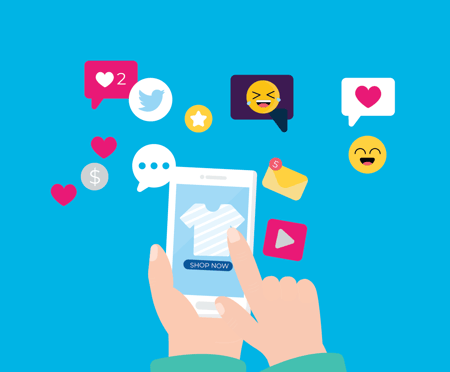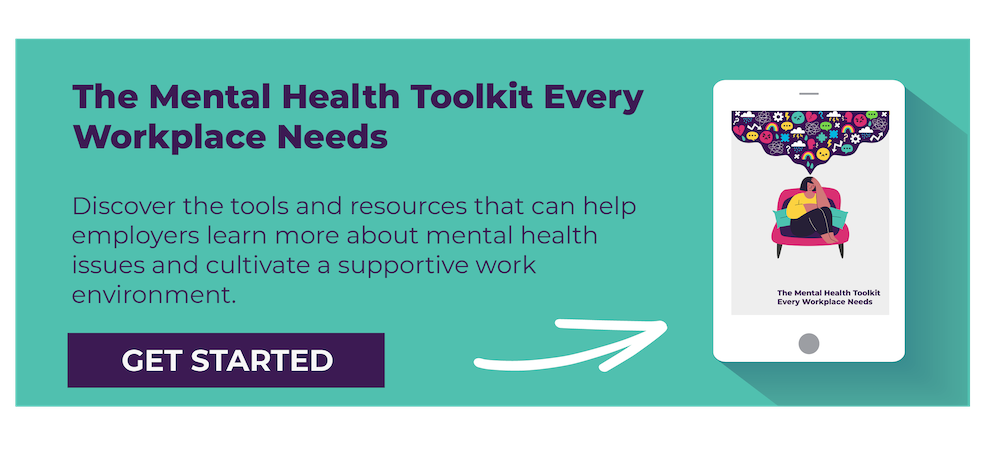Ever wonder about the social media effects on mental health?
Given that many working professionals have at least one social media account, it’s a topic employers should explore when it comes to employee mental health. While social media platforms are great for keeping in touch, there’s also a trade-off of decreased mental health for many.
On average, people spend almost two and a half hours on social media sites daily. Mindless scrolling doesn’t come without a price: Researchers are finding too much social media has a negative impact on mental health.
This post will share insights into how social media impacts the mental health of employees and alternative healthy ways to spend time instead.
Here’s a closer look at the social media effect on mental health:
Creates a Fear of Missing Out
One Finland study indicates that a “fear of missing out” or FOMO may be keeping people up at night scrolling their feeds. This in turn was shown to adversely influence sleep quality, especially among working professionals. Lack of sleep can cause brain fog, slower reaction times, anxiety, and even depression.
Increases Depression Risk
When constantly viewing someone’s “highlight reel” of their vacations, good hair days, career promotions, and more, this can lead to a feeling of discontent. A 2014 study by the University of Houston found Facebook users regularly viewing this content were linked to a greater risk of depression. The study found frequent logins correlated to a higher incidence of depressive symptoms, too.
Spikes Risk of Anxiety
Young, female social media users are at a higher risk of developing an anxiety disorder when they spend too much time on social media. Researchers also believe it’s possible that those who already experience social anxiety often continue to experience uncomfortable social situations when replacing in-person interactions with social media use on a regular basis.
RELATED: 5 Myths About Anxiety Your Anxious Employees Want You to Know
Spreads Misinformation on Health Topics
In an age where information comes out online faster than most of us can reasonably consume it, it’s no surprise most people only read a headline of news stories before moving on. One study by Columbia University and the French National Institute found that 59 percent of links shared on social media have never been clicked. In an era of clickbait titles to get more shares, this is especially dangerous when it comes to science or health topics.
Creates a Cycle of Doom
Humans are seemingly wired to hone in on the bleak side of life. This characteristic, a relic of our ancestors' survival instincts, has evolved to navigate potential threats in the wild. But now, it's taken on a whole new playground - social media.
Platforms such as Instagram and TikTok have perfected the art of serving us content based on our unique likes and dislikes, aiming to keep us engaged for as long as possible. And what do they discover about us? Our subtle leaning towards engaging with not-so-sunny content, which swiftly reshapes our feeds to match this predilection. According to the The Doomscrolling Pandemic 2023 study, about 72% of workers admit to missing a deadline or underperforming on a task due to doomscrolling on the job.
Impacts Relationships Negatively
While it’s easier to stay connected with social media, it can also lead to spending less quality in-person time with other people. A 2021 study looked at the connection between social media and relationship satisfaction.
Increased usage of Instagram led to a decrease in relationship satisfaction and more conflict and negative outcomes. These in turn triggered an “addictive use of Instagram,” the study reported.
RELATED: What is Social Health? A Pillar of Wellness Workers Need Now
Increases Feelings of Loneliness
Reducing social media usage can help people feel less isolated. One 2018 study in the Journal of Social and Clinical Psychology found high levels of social media usage increase feelings of loneliness and can create an unhealthy self-centeredness, too.
Healthy Ways to Spend Time That Don’t Involve Social Media
Looking to replace social media with a positive, healthy activity? Think back to a time before social media was popular or before you had the latest smartphone. What did you do for fun? What relaxed you?
There are tons of alternative ways to entertain your mind that are better for your mental health.
Here are just a few ideas:
- Read - Reading (preferably a good old-fashioned paperback) can keep you off your phone and learning about new topics or discovering fantasy worlds. A 2019 University of Sussex study found that reading can reduce stress by up to 68%.
- Exercise - A recent report published in the Journal of Public Health found replacing even 30 minutes of social media time with exercise can “significantly improve mental health.” The positive impacts were felt even six months after the study ended. Daily walking is also thought to fight the onset of dementia, too.
- Journal - Writing down thoughts and feelings can help the mind find clarity, relief, and even answers. Journaling allows the writer to organize ideas, problem solve and better understand stress triggers.
- Enjoy nature - Spending time outdoors and in nature can help mental health issues like depression and anxiety. The American Psychological Association reported other benefits, including lower stress, improved mood, and increased attention spans.
- Try conversation cards - Get a stack of conversation starters to try out with a loved one or friend. You can make your own or buy them. This is a great way to develop deeper connections and spend quality time with those you care about — without your phone.
This is just a starter list of activities that are more productive than scrolling social media mindlessly. Create a written list (not on your phone as it can distract you) of activities to try when you are itching to get on social media. Anything from spending time learning a new language to stretching to visiting a neighbor or volunteering in your community can help you feel better about the way you spend your free time.
What are some healthy alternatives you use to avoid social media? Share your thoughts in the comments below!



